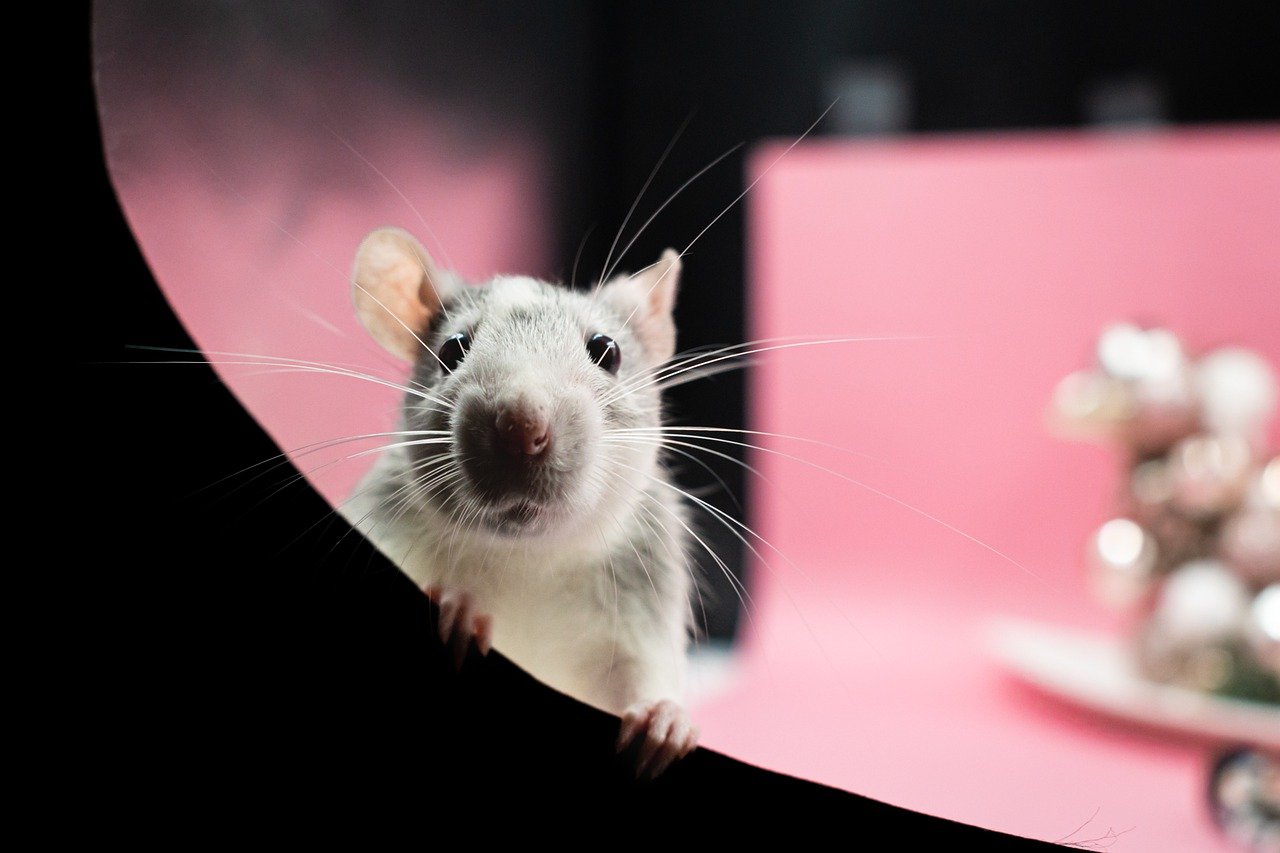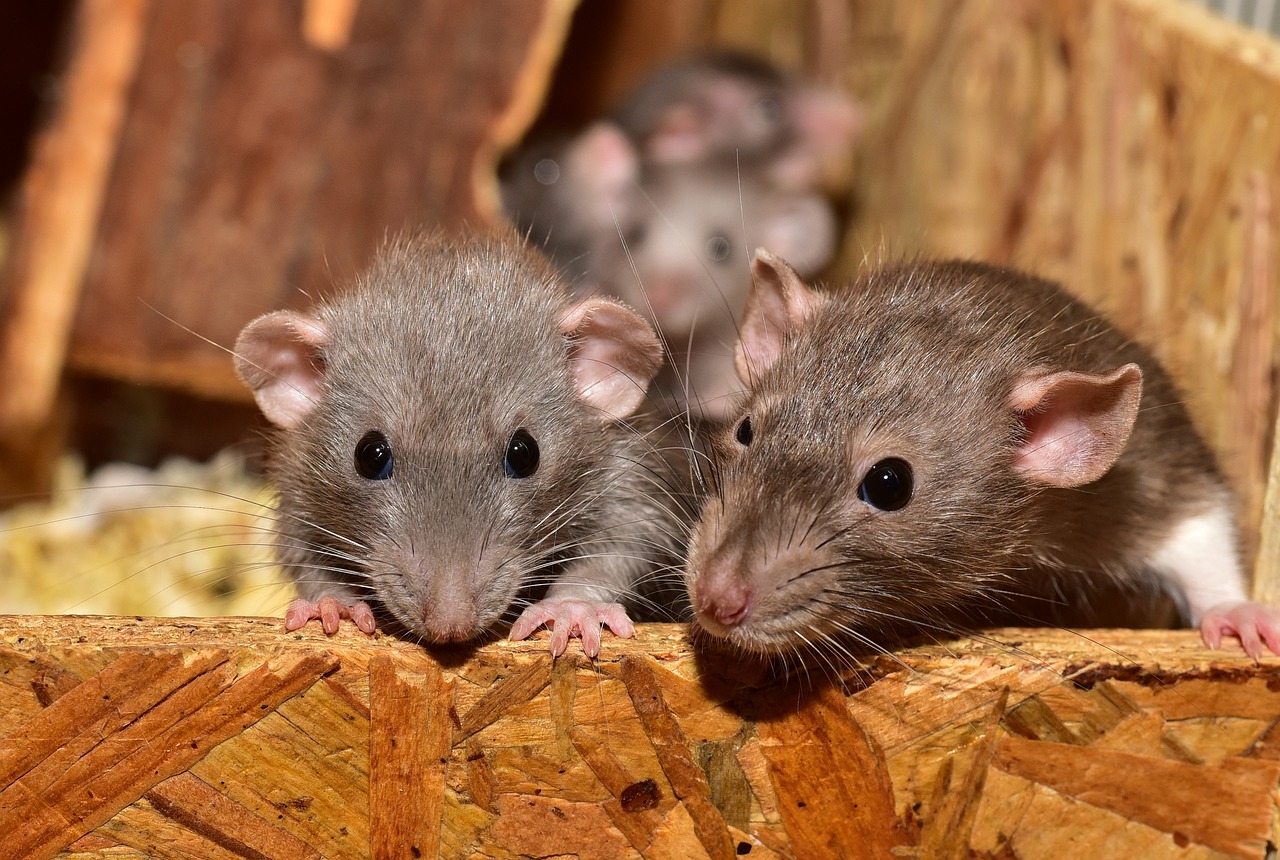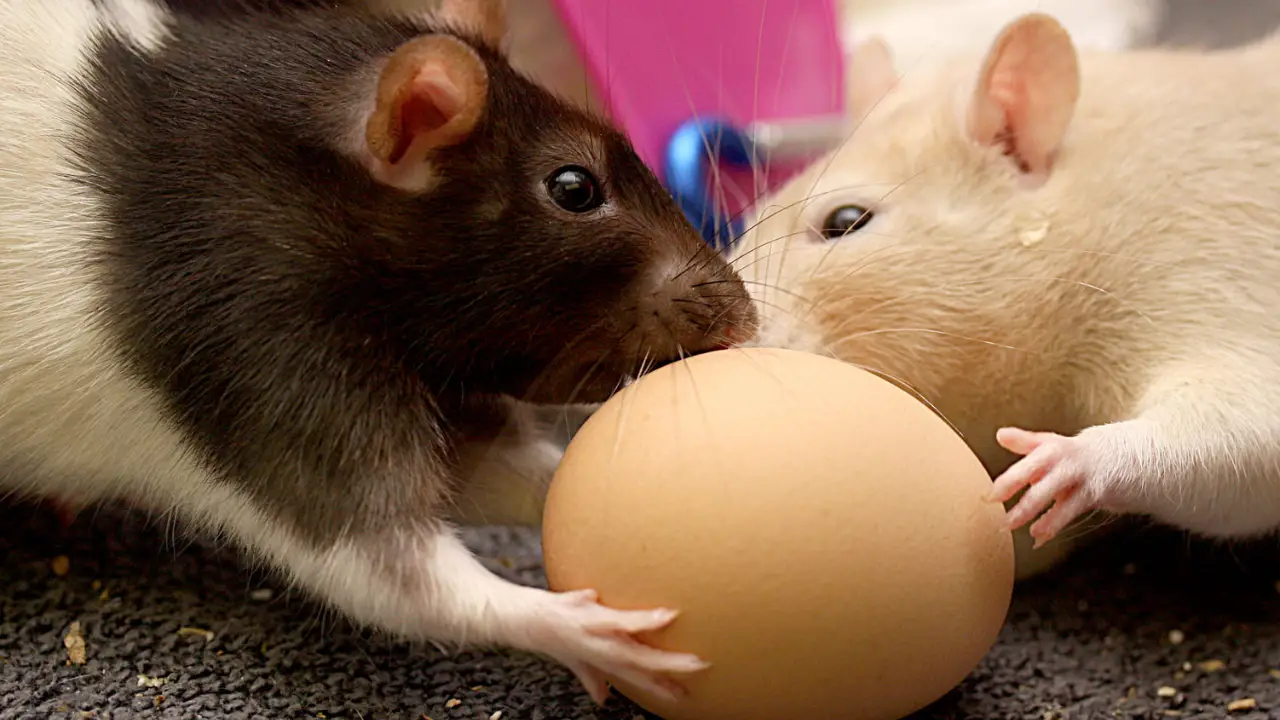Imagine you wake up in the morning and go to the chicken coop to collect eggs for breakfast but see no eggs and broken eggshells. What could be the problem? There can be two main highlighted reasons for this problem. The first one is that chickens eat their eggs, and the second is that rats eat chicken eggs when the opportunity arises.
This article focuses on the second reason, how rats eat chicken eggs and how to keep rats away from eggs. We discuss this deeply, so you can easily prevent rats from eating chicken eggs.
Let’s begin.
Do Rats Eat Chicken Eggs?
Yes, rats, including house mice, Norway rats, and roof rats, do eat chicken eggs. Rats are omnivores (eat almost everything) and nocturnal (active at night), so it’s common to wonder, “Do rats eat chicken eggs at night or at day time?” The simple answer is yes; they mostly eat at night.
However, if they eat mostly at night when everyone sleeps, do rats eat chicken eggs during the day? Yes, they eat. They feel hungry too and can eat chicken eggs during the day, but they have more chances to steal and eat eggs at night.
Additionally, rats in and around coops can cause many issues besides eating eggs. They damage the infrastructure, stress chickens, and spread diseases.
Rats are attracted to dirtiness, spilled feed, eggs, drinking water, and even your baby chickens! Poorly designed coops and feeders can also attract rats.
To prevent rats or mice from entering the coop, you must maintain cleanliness in and around the coop, store feed in sealed containers, and repair and seal holes where rats might enter.

Do Pack Rats Eat Chicken Eggs?
Pack rats, also known as woodrats, are herbivores that rarely eat chicken eggs. Their diet is focused on vegetation and small invertebrates rather than more oversized food items like eggs. They mainly eat plants, seeds, fruits, and nuts.
However, if pack rats have no food to eat, they will explore different ways to find food and might eat chicken eggs. However, this is rare, and they are likelier to be interested in small food items.
Pack rats are not usually the main threat to chicken eggs, but other types of rats are. However, ensuring your chicken coop is secure can help keep your chickens and their eggs safe.
Do All Types of Rats Eat Chicken Eggs?
Yes, all types of rats can eat chicken eggs. However, how often they do this depends on various factors, such as the availability of other food, the kind of rat, and the environment.
The most common types are Norway rats, roof rats, and house mice (often grouped with rats due to similar behaviors.
- Norway Rats
Norway rats, also known as brown or sewer rats, are large, robust, and have strong teeth. They are omnivores, eating grains, fruits, vegetables, meat, and eggs.
- Roof Rats
Roof rats, or black rats, are smaller and more agile (able to move quickly and easily) than Norway rats. They like to nest in high places like trees, roofs, and attics. Roof rats prefer fruits, nuts, and grains but also will eat eggs if they can.
- House Mice
House mice are smaller than rats but act similarly. They mainly eat grains and seeds but will eat eggs if other food is scarce. Their small size allows them to squeeze through tight spaces to reach nests.

Signs of Rats in a Chicken Coop
How can you tell if rats have eaten the eggs? Look for signs of rats in the chicken house to prove they ate the eggs:
- Rat Holes: Rats dig holes for shelter and to store food.
- Rat Droppings: Look for small, dark brown droppings near feeding areas.
- Gnaw Marks: Rats chew on wood, wire, and other materials to get in.
- Nests: Rats build nests under chicken houses or in rock piles.
- Rat Runs: Paths made by rats traveling between their shelter and food sources.
- Disappearing Food: If food goes missing overnight, rats might be to blame.
- Scratches: Look for scratches in and around the coop.
- Chewed Holes: Rats can chew through netting and timber.
- Droppings: Rat droppings are a common sign.
- Strong Urine Smell: Rats have strong-smelling urine.
- Nocturnal Noises: Listen for scratching sounds at night.
- Stressed Chickens: Rats can stress chickens, making them act differently.
- Eaten Eggs: Rats will eat chicken eggs.
- Dead or Injured Chickens: Rats can harm chickens.
- Damaged Feed Bags: Check for holes in feed bags or containers.
- Missing Chicks: Rats may take baby chicks.
- Footprints and Tail Marks: In dusty areas, look for rat tracks.
- Pet Behavior: chickens may get agitated around the coop if there are rats.
- Smudge Marks: Rats leave greasy marks along their paths.
- Avoiding the Coop: Chickens avoiding the coop or nesting boxes can indicate rats.
- Damaged Items: Look for chewed wires or disturbed bedding.
If you see any signs of rats, confirm them and then take steps to keep them out of the chicken house.




How to Stop Rats from Eating Chicken Eggs
Here are some simple and effective ways to keep rats away from chickens coop to prevent eggs:
- Secure the Coop
Seal any small openings in your coop and cover any gaps with hardware cloth or metal mesh. Raise the coop off the ground to make it harder for rats to enter.
- Use rodent-proof feeders
Get feeders that close automatically to prevent rats from accessing the feed. Keeping food off the ground helps reduce the chance of attracting rats.
- Store Feed Properly
Keep chicken feed safe in metal containers with tight-fitting lids to prevent rats from smelling and accessing.
- Clean Regularly
Maintain cleanliness in and around the coop. Remove leftover food and split feed daily. Clean out any debris that attracts rats.
- Collect Eggs Frequently
Gather eggs multiple times a day. The less time eggs spend in the coop, the less chance rats have to find and eat them.
- Use Rat Deterrents
Use peppermint oil, as rats dislike the smell of peppermint. Soak cotton balls in peppermint oil and place them around the coop. Place mothballs in mesh bags and hang them around the coop’s exterior. Keep them out of reach of chickens.
- Set Traps
Use humane traps or snap traps around the perimeter of your coop. Check them regularly and relocate or dispose of any caught rats.
- Get a Coop Guard
Consider getting a cat or a small dog known for hunting rodents. They can be effective in keeping rats away.
- Rodent-proof Nesting Boxes
Use nesting boxes that have a tight-fitting lid or a flap that closes once the hen leaves. This keeps eggs safe from rats.
- Professional Pest Control
If the rat problem persists, contact a professional pest control service. They can provide more effective and long-lasting solutions.
Problems Caused By Rats to Your Chickens
Rats can become a big problem if not prevented or if preventive measures are not taken at the time. Here are the problems/issues that rats cause to chickens:
- Eat chicken feed
- Eat chicken eggs
- Can eat baby chicks
- Contaminate their feed, water, and coops with droppings, urine, and hair
- Transmission and spreading of diseases and carrying parasites like lice, fleas, and mites
- Structural damage from burrowing and gnawing through coop materials
- Causes physical harm to chickens
- Causes stress in chickens
- Lowering egg production due to stress, if this happens you can read our article about increasing egg production here.
If rats become a problem, you must quickly find the cause and use preventive measures to prevent them from entering your chickens’ coops and eating their eggs.
What Diseases Can Chickens Get From Rats?

Rats can carry diseases that affect your chickens. They can contaminate your chicken eggs, feed, water, and environment and spread diseases through their feet, fur, and feces.
It’s crucial to maintain good biosecurity to protect your flock. Be vigilant about hygiene and manage your routine to prevent rodents from becoming bold.
Here are some of the main diseases that rats can cause in your chickens:
-
Weil’s Disease
Weil’s disease, also called Leptospirosis, is a bacterial infection from animals like rats and cows. Chickens can get it by touching rat urine, often in dirty water.
Symptoms can take up to a month after infection:
Red eyes
Behavioral changes
Diarrhea etc
-
Hantavirus
Hantaviruses are a group of viruses that are carried by rodents like rats; the most common carriers are mice of the genus Peromyscus.
Symptoms:
Looking weak
High temperature
Coughing
-
Salmonellosis
The Salmonella bacteria cause salmonellosis. Rats can carry these bacteria and spread them through their droppings. Chickens can ingest these bacteria when they come into contact with contaminated feed, water, or surfaces.
Symptoms:
Diarrhea
Lethargy
Loss of appetite
-
Leptospirosis
Leptospira bacteria cause leptospirosis. Rats excrete these bacteria in their urine, and chickens can contract this disease by drinking contaminated water or eating contaminated feed.
Symptoms are rarely apparent:
Affect overall health
Affect egg production
-
Fowl Cholera
The Pasteurella multocida bacteria cause fowl cholera. Rats can carry these bacteria and spread them through direct contact or contaminated environments.
Symptoms:
Swelling of the wattles
Respiratory distress
Sudden death
-
Avian Pox
Avian pox is a viral disease that can spread through bites from infected rats. The virus can cause lesions on the skin and in the respiratory tract of chickens.
Symptoms:
Wart-like lesions on the comb, wattles, and beak
Difficulty breathing if the respiratory tract is affected
-
Rat-Bite Fever
Rat-bite fever can be caused by either Streptobacillus moniliformis or Spirillum minus. While more commonly transmitted to humans through bites or scratches from rats, chickens can also become infected through contact with contaminated environments.
Symptoms are not well-documented:
Lead to secondary infections
Cause stress
If not prevented, rats can sometimes cause your chickens to contract many other diseases and issues, such as Parasites (ticks and fleas).
Preventing Rats in Chicken Coops

- Regular Cleaning
Remove droppings and scattered feed regularly to avoid attracting rodents.
- Use a Good Feeder
Use waste-reducing feeders like the Dine A Chook feeder, which prevents chickens from spreading feed.
- Collect Eggs Daily
Collecting eggs daily or twice a day will reduce the chances of attracting rats.
- Remove Feed at Night
Store feed away from the coop as rats mostly come out at night, so keep the coop free of food.
- Install Wire Mesh
Use 10mm x 10mm galvanized wire mesh to keep rats from entering the coop.
- Seal Holes
Close any holes and gaps in the coop walls and use steel wool and concrete to fill them. Install a metal plate under the coop.
- Avoid Scraps
Avoid feeding kitchen scraps regularly, as scraps attract rats. Always pick up any leftover scraps to avoid attracting pests.
- Secure Compost and Feed Bags
Keep the compost bin outside the chicken run, ensuring it has enough carbon to deter rats. Store feed in a secure container.
- Remove Water Sources
Use lubing cups or nipples, which provide water with minimal spillage and make it less attractive to rats.
- Maintain the Coop Surroundings
Keep grass and any other bush cut around the coop; this will reduce hiding places for rats.
Tools/Things That Prevent Rats from the Chicken Coops
- Use Traps
Live Traps: These traps capture rodents without harming them. Once you catch a rodent, remove it from your area.
Snap Traps: To use them effectively, bait the traps and leave them unset for a few days to attract rodents. Then, set the traps.
Electronic Traps: These battery-powered traps provide an easy way to eliminate rodents. They kill the rodents with an electric shock.
- Use Baits
Quick-Kill Options: These baits work fast to eliminate rodents.
Anticoagulants: These are effective but require careful handling. Always follow the directions on the label.
- Use Natural Eliminators
Attract natural predators like barn owls or cats to control rodent populations.
- Use Ultrasonic Devices
Use Battery-Operated Devices to repel rodents with ultrasonic sound waves.
- Use Rat Poison
Poison should be a last resort due to the risk to chickens. If necessary, use first-generation rodenticides with lower secondary poisoning risks.
- Regular Inspection
Regularly inspect for new holes or signs of rodent activity and take quick action to prevent them.
- Seek Professional Help
If rodent problems continue, consult a pest control professional for help.
| Note:
Keeping your chickens safe means avoiding traps and poisons. Traps can hurt animals, so pick ones that won’t harm your chickens. For rodent problems, use non-toxic “poisons” made from natural stuff. |
The End
Ultimately, rats eat chicken eggs due to their high nutritional value and easy accessibility. In addition to eating your chicken eggs, rats also cause many more problems, such as the spread of disease.
To protect your chickens and their eggs from rats, you need to take preventive measures, such as securing the couple, maintaining cleanliness, collecting eggs multiple times, etc.
If the rat problem worsens and you cannot control them, you should seek help from an expert or pest controller to solve it.
Let us know if this article helped you prevent or control rats from eating chicken eggs. Share your thoughts and problems with us—we would love to help you!
Commonly Asked Questions
Do chickens eat rats?
Chickens generally do not eat rats. While they might peck at small rodents out of curiosity, they are not predators of rats.
Do rats eat eggshells?
Yes, rats can eat eggshells. They are attracted to the nutrients in the eggshells, such as calcium, and will consume them if available.
Do rats scare chickens?
Rats can scare chickens. The presence of rats in a coop can cause stress and anxiety, disrupting their normal behavior.
Can rats fit through chicken wire?
Rats can fit through chicken wire if the holes are large enough. To keep them out, more than standard chicken wire with more significant gaps might be required.
How do we deter rats from chicken coops?
To deter rats from chicken coops, ensure all food is stored securely, use smaller mesh wire to block entry points, and keep the coop clean and free of debris where rats might nest.
Do rats eat chicken poop?
Yes, rats do eat chicken poop. They are opportunistic feeders and will consume almost anything, including chicken droppings.
Can a chicken kill a rat?
It is rare, but a determined chicken might kill a small rat if it poses a threat. However, chickens are generally not equipped to kill large rats.
Can mice eat chicken eggs?
Yes, mice can eat chicken eggs, especially if the eggs are cracked or damaged. Furthermore, they may also nibble on the shells for nutrients.
How do rats kill chickens?
Rats typically do not kill adult chickens but may attack and kill chicks or smaller birds, additionally, they can also spread diseases that can be harmful to chickens.
Hello! I’m Ibrahim, the owner and writer of this blog. I run a chicken farm with 160 chickens, and I’ve gained a lot of knowledge about raising and caring for them. Now, I want to share my insights and experiences with you to help you in chicken keeping.


2 thoughts on “Do Rats Eat Chicken Eggs? How to Stop Them From Eating”